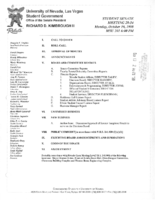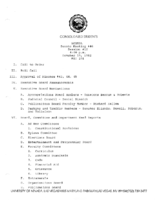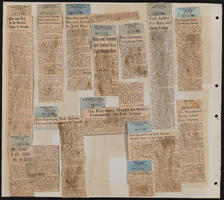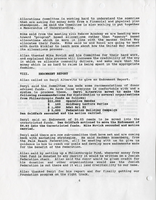Search the Special Collections and Archives Portal
Search Results

Depictions of Black people in various media and advertisements (including offensive caricatures, racist slogans and names, and non-Black people in Blackface)
Date
Archival Collection
Description
Folder from the Roosevelt Fitzgerald Professional Papers (MS-01082) -- Personal and professional papers file.
Mixed Content

Meeting minutes for Consolidated Student Senate University of Nevada, Las Vegas, October 19, 1998
Date
Archival Collection
Description
Text

Meeting minutes for Consolidated Student Senate, University of Nevada, Las Vegas, October 9, 1979
Date
Archival Collection
Description
Text

Meeting minutes for Consolidated Student Senate, University of Nevada, Las Vegas, October 19, 1982
Date
Archival Collection
Description
Text
Tick Segerblom (Clark County Commisioner) oral history interview conducted by Magdalena Martinez and Taylor Cummnings: transcript
Date
Archival Collection
Description
From the Lincy Institute "Perspectives from the COVID-19 Pandemic" Oral History Project (MS-01178) -- Elected official interviews file.
Text

Helen Yu oral history interview: transcript
Date
Archival Collection
Description
Oral history interview with Helen Yu conducted by Andrew Yu on December 1, 2021 for Reflections: The Las Vegas Asian American and Pacific Islander Oral History Project. Helen Yu discusses her upbringing in Seoul, South Korea, her grandfather's immigration to the United States in the late 1970s, and her family's decision to follow him to Portland, Oregon in 1984. She shares her family's history and their experiences during the Korean War, including what life was like both in North and South Korea at that time. Helen Yu discusses her undergraduate education at the University of Oregon studying graphic design and her graduate education at Ewha Womans University College of Art and Design in South Korea. She shares her thoughts having both a Korean American and Asian American identity, her marriage and two wedding ceremonies to her Korean husband, and her family's move to Las Vegas, Nevada in 2001. Helen Yu concludes with a discussion of her event planning work which led to her current role as the Operations Manager at the Emerald at Queensridge in Las Vegas.
Text

Transcript of interview with Joel Bergman by Stefani Evans and Claytee D. White, August 03, 2016
Date
Archival Collection
Description
Born in 1936, architect Joel Bergman spent his childhood in Venice, California, the son of Edythe Klein and Harry Bergman, a baker who later turned to dealing in scrap metal. The award-winning designer of such Las Vegas projects as the International Hotel, the MGM Grand Hotel (later Bally's), additions to the Riviera Hotel and the Golden Nugget downtown, the Mirage, Treasure Island, Paris Casino Resort, Caesars Palace, Trump International Hotel and Tower, the Signature at MGM Grand, Rhumbar, Gilley's at Treasure Island, and the Tropicana Hotel and Casino first arrived in Las Vegas in 1968 to work on the International Hotel. In this interview, Bergman discusses his architectural career, which began with his graduation in architecture from the University of Southern California; he also discusses his work with Martin Stern, his sixteen years with Steve Wynn, and the formation of his own architectural firm, Bergman Walls and Associates. Throughout, he pays tribute to the three mentors who had the greatest influence on his work—USC architecture professor Carleton Winslow, architect Berton Severson, and client Steve Wynn—and the ways they visualized people moving through space. He acknowledges other professionals whose work he admired and talks about his wives Marlene Federman, Terrie Colston, Maria Nicolini, and Valentina Bogdanova as well as his children and stepchildren. Joel David Bergman passed away August 24, 2016, three weeks after he gave this interview.
Text

Transcript of interview with Maxwell Kent "Tim" Hafen by Stefani Evans and Claytee White, September 14, 2016
Date
Archival Collection
Description
With so much emphasis put on the growth of Las Vegas and Henderson over the past thirty years, we often forget about the development of the others cities in the Valley. Expansive growth in Southern Nevada in the mid-twentieth century shows the region being one of the last bastions of agricultural existence, and Tim Hafen has been a major player in the development of the city of Pahrump. Born in St. George, Utah, and raised in Mesquite, Nevada, he graduated from Virgin Valley High School and attended Dixie College. Before the Bureau of Land Management (BLM) was called as such, his father introduced him to the working of the land through dairy and hay farming, where a young Tim decided he would never milk a cow again. His rejection of cow milking didn’t deter him from following the influence of his father after he married his wife, Eleanor, in 1951 and moved to Pahrump to become a cotton farmer. At that time, there were only 150 people in the area with a third of the population being from the Paiute tribe. Once the city was incorporated in 1964, he founded the Pahrump Valley Utility Company to get electricity to the area along with Amargosa Valley. Top crops at the time included cotton, alfalfa as well as wheat that were picked by Mexican farm laborers used under a yearlong contract with the Bracero program. vi In this interview, Hafen shares how he began his career in politics from getting called for grand jury in 1963. From 1966–1974, he was a member of the legislature, where he served two terms in the Old Capital building and held various positions such as Chairman of the State Board of Agriculture for twelve years and President of the Nevada Farm Bureau. He was speaker pro tem and Chairman of the taxation committee and decided to call it quits because of the Nixon scandal. Between 1974 and 1975 Hafen ended his political career, which he did before brothels began to come to the area later in the decade. In 1982, in the wake of the gasoline crisis, Hafen, like other Pahrump cotton farmers, could not afford to continue farming; he decided to shift from farming to development. His first development done was Cottonwoods at Hafen Ranch, which was on 160 acres of alluvial fan, non-farmable land; in 2000 he opened his second subdivision, Artesia at Hafen Ranch.
Text


